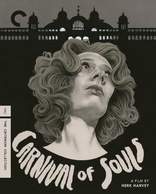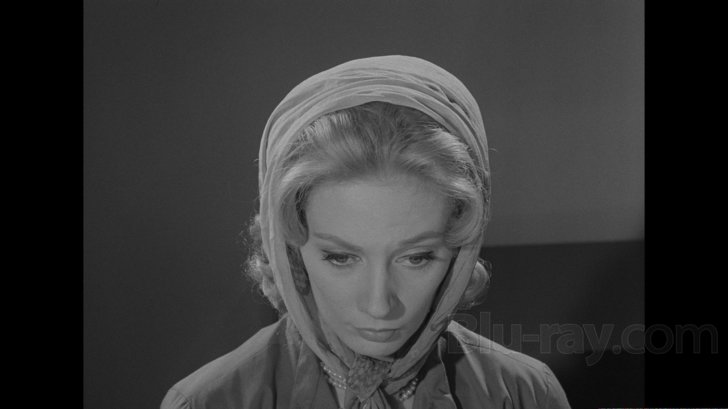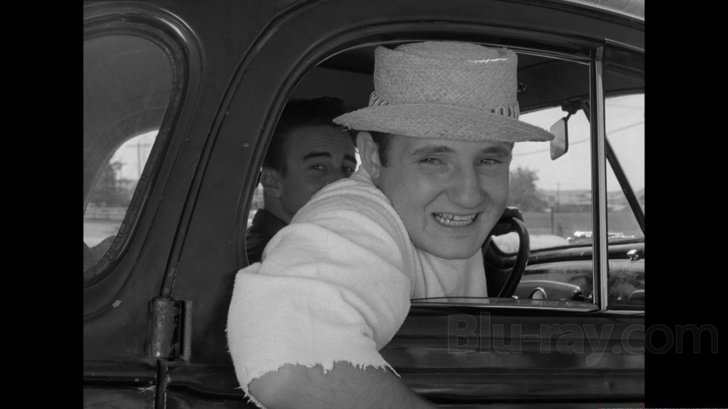Carnival of Souls Blu-ray Movie
HomeCarnival of Souls Blu-ray Movie 
Criterion | 1962 | 78 min | Rated PG | Jul 12, 2016
Movie rating
7.4 | / 10 |
Blu-ray rating
| Users | 0.0 | |
| Reviewer | 4.5 | |
| Overall | 4.5 |
Overview
Carnival of Souls (1962)
Mary Henry ends up the sole survivor of a fatal car accident through mysterious circumstances. Trying to put the incident behind her, she moves to Utah and takes a job as a church organist. But her fresh start is interrupted by visions of a fiendish man. As the visions begin to occur more frequently, Mary finds herself drawn to the deserted carnival on the outskirts of town. The strangely alluring carnival may hold the secret to her tragic past.
Starring: Candace Hilligoss, Frances Feist, Sidney Berger, Art Ellison, Stan LevittDirector: Herk Harvey
| Horror | Uncertain |
| Psychological thriller | Uncertain |
| Mystery | Uncertain |
| Supernatural | Uncertain |
Specifications
Video
Video codec: MPEG-4 AVC
Video resolution: 1080p
Aspect ratio: 1.37:1
Original aspect ratio: 1.37:1
Audio
English: LPCM Mono (48kHz, 24-bit)
Subtitles
English SDH
Discs
50GB Blu-ray Disc
Single disc (1 BD)
Playback
Region A (locked)
Review
Rating summary
| Movie | 3.5 | |
| Video | 5.0 | |
| Audio | 5.0 | |
| Extras | 5.0 | |
| Overall | 4.5 |
Carnival of Souls Blu-ray Movie Review
Reviewed by Dr. Svet Atanasov June 18, 2016Herk Harvey's "Carnival of Souls" (1962) arrives on Blu-ray courtesy of Criterion. The supplemental features on the disc include an original trailer for the film; deleted scenes and outtakes; archival audio commentary with director Herk Harvey and screenwriter John Clifford; Ed Yates' documentary "Saltair: Return to the Salt Queen"; new featurette with writer and comedian Dana Gould; and a lot more. The release also arrives with an illustrated leaflet featuring an essay by writer and programmer Kier-La Janisse. In English, with optional English SDH subtitles for the main feature. Region-A "locked".

The new organist
The film instantly pulls you into its reality. It looks familiar, but before you can get comfortable with it a lot happens very quickly. There is a drag race, a car is bumped into a river and then bodies are recovered. The only survivor is a young woman named Mary Henry (Candace Hilligoss) who canít quite remember what has happened. When the shock wears off, she drives to Utah to replace a deceased organist.
The town seems peaceful and quiet -- at least in the beginning. Mary quickly moves into a small but cozy apartment and then visits the church that has hired her. It is exactly as she had imagined it would be -- not too small and not too big, with a beautiful old-fashioned pipe organ that has been kept in perfect condition.
Then a gradual but noticeable shift occurs -- and you are not surprised. You have been expecting it to happen but you were unsure when or why. It was just an odd sensation you had that it was coming. Like you, Mary also recognizes it and becomes terrified. She would try to talk to people but they will ignore her, and then she will see things that no one else would. For some unknown reason she would also find herself drawn to an abandoned carnival pavilion that may have been overtaken by ghosts.
This low-budget film scripted by John Clifford and directed by Herk Harvey -- who had previously done some fairly straightforward documentaries and commercials for the Centron Corporation in Lawrence, Kansas -- enjoys a well-deserved cult status. It does look a bit dated now, but it is a serious mind-bender with some genuinely creepy atmosphere.
The narrative is broken into multiple segments that constantly pull the film in different directions. For example, there are bits with some obvious Hitchcockian overtones that would easily fit in an old-fashioned thriller. Elsewhere, however, there is plenty of gothic exoticism that infuses the film with dark and quite heavy intensity. The entire film is also shot in a way that reveals an obvious desire to manipulate expectations without necessarily worrying about the legitimacy of key aspects of the narrative that bring some coherence to it during the final act.
Carnival of Souls is frequently grouped with various classic horror films, but it is probably more appropriate to place next to the likes of Jean Cocteauís Orpheus and Alain Resnaisí Last Year at Marienbad. Though far less refined (and at times actually visibly flawed), it seems to be driven by a similar ambition to experiment with contrasting themes and ultimately creating and delivering a unique cinematic experience.
The acting is rather difficult to judge. Hilligoss frequently looks uncomfortable and nervous but her character actually benefits because the shift that occurs during the second act makes the roughness look most appropriate. The same can be said about the non-professional actors that step up in front of the camera as their odd lines and stiffness further enhance the spooky atmosphere.
Criterionís upcoming release of Carnival of Souls includes the shorter Theatrical Version of the film. Before the filmís theatrical and drive-in premieres in 1962, some footage was intentionally removed by its producers. Additionally, one reel of the film was accidentally destroyed and approximately 8 minutes of footage from the dance sequence at the end was lost. However, Criterionís release features three missing scenes, with head and tail from the new restoration of the film, that were sourced from an analog one-inch videotape (the best available source for this material).
Carnival of Souls Blu-ray Movie, Video Quality 

Presented in its original aspect ratio of 1.37:1, encoded with MPEG-4 AVC and granted a 1080p transfer, Herk Harvey's Carnival of Souls arrives on Blu-ray courtesy of Criterion.
The following text appears inside the leaflet provided with this Blu-ray release:
"This new digital transfer was created in 4K resolution on a Scanity film scanner from the 35mm original camera negative. Thousands of instances of dirt, debris, scratches, splices, and warps were manually removed using MTI Film's DRS, while Digital Vision's Phoenix was used for small dirt, jitter, and flicker. The original monaural soundtrack was remastered from the 35mm original soundtrack negative. Clicks, thumps, hiss, hum, and crackle were manually removed using Pro Tools HD and iZotope RX 4.
Transfer supervisor and colorist: Lee Kline.
Scan: Prasad Corporation/Burbank, CA."
The film has been recently restored in 4K and looks simply magnificent in high-definition. In fact, I think that a lot of the improvements are as substantial as those witnessed on the recent release of Jack Clayton's The Innocents. Obviously, these are different projects, but the two films come from the early 1960s and after 4K restorations both have very similar organic appearances. Detail and clarity are far better now, but the massively improved fluidity is where the restoration really shines. There are other aspects of the presentation that also enhance the big jump in quality -- such as improved balance and much wider and healthier ranges of nuances -- but the film now has such a solid fluid appearance that ultimately there is an entirely different viewing experience. Indeed, there isn't even a whiff of the unevenness that lumpy grain, judder, or very basic age-related anomalies can introduce; from start to finish the film simply remains consistently crisp and enormously lush. Fantastic presentation. (Note: This is a Region-A "locked" Blu-ray release. Therefore, you must have a native Region-A or Region-Free player in order to access its content).
Carnival of Souls Blu-ray Movie, Audio Quality 

There is only one standard audio track on this Blu-ray release: English LPCM 1.0. Optional English SDH subtitles are provided for the main feature.
There are massive improvements in the audio department as well. This is a film that relies heavily on music to create and sustain a very unique atmosphere and the depth of sound is very important. Fortunately, the lossless track easily handles the small music nuances and as a result the subtle shifts that occur throughout the film become that much more impressive. The dialog is clean, stable, and always easy to follow.
Carnival of Souls Blu-ray Movie, Special Features and Extras 

- Trailer - original U.S. trailer for Carnival of Souls. In English, not subtitled. (3 min, 1080p).
- Deleted Scenes - presented here are three scenes that were cut from Carnival of Souls before its theatrical and drive-in premieres in 1962. Criterion clarify that these scenes were not reinserted in the new master that was used to produce this release (to create a more complete version of the film) because the best available source for this material is an analog one-inch videotape. These are the three longest cut scenes, with head and tail from the new restoration. In English, not subtitled.
1. Organ Factory (2 min, 1080p).
2. Running (1 min, 1080p).
3. Doctor's Office (2 min, 1080p).
- Outtakes - presented here is a collection of outtakes with music from composer Gene Moore's original organ score. Music only. (28 min, 1080p).
- Final Destination - in this new featurette, writer and comedian Dana Gould discusses his fascination with horror films, the cult image of Carnival of Souls, its similarities with Night of the Living Dead and why it is an even more effective film, the era in which the film emerged from and the then-current socio-political climate in America, Candace Hilligoss and Sidney Berger's performances, the importance of Gene Moore's score, etc. The featurette was produced exclusively for Criterion in 2016. In English, not subtitled. (23 min, 1080p).
- The Movie That Wouldn't Die! - presented here is an archival documentary that was made in celebration of the 1989 theatrical rerelease of Carnival of Souls. In it dierctor Herk Harvey and writer John Clifford explain how the idea for Carnival of Souls emerged, and discuss the funding process, the shooting of the film in Kansas, etc. Also included are comments from film buff Mark Syverson, filmmaker Tim DePaepe, investor Glenn Kappelman, actress Candace Hilligoss, etc. At the end there is a 2000 tour of select key locations seen in the film. (It comes after the documentary ends). The documentary was produced by Bill Shaffer of KTWU Channel 11 in Topeka, Kansas. In English, not subtitled. (33 min, 1080i).
- Regards from Nowhere - in this new video essay, critic and filmmaker David Cairns discusses the unique identity of Carnival of Souls and the strange reality in which its main protagonist exist. The essay was produced exclusively for Criterion in 2016. In English, not subtitled. (24 min, 1080p).
- Saltair: Return to the Salt Queen - presented here is an archival documentary which was shot by veteran broadcaster Ed Yates for Salt Lake City's KCPX-TV in 1966. The documentary examines the sad history of the spooky pavilion that is seen in Carnival of Souls. In English, not subtitled. (26 min, 1080p).
- The Centron Corporation - presented here is a collection of segments from various documentaries director Herk Harvey and screenwriter John Clifford made for the Kansas-based Centron Corporation. Also included is a short commercial. In English, not subtitled.
1. Star 34 (1954). In English, not subtitled. (13 min, 1080i).
2. Rebound (1954). In English, not subtitled. (22 min, 1080i).
3. Case History of a Sales Meeting (1963). In English, not subtitled. (6 min, 1080i).
4. To Touch a Child (1966). In English, not subtitled. (12 min, 1080i).
5. Centron Commercial (ca. 1967). In English, not subtitled. (3 min, 1080i).
6. Signals: Read 'em or Weep (1982). In English, not subtitled. (6 min, 1080i).
- The Centron Corporation: Essay - presented here is an archival essay on the history of the Centron Corporation which appeared in Ken Smith's book Mental Hygiene: Classroom Films 1945-1979. It is read by writer and comedian Dana Gould. In English, not subtitled. (10 min, 1080p).
- Commentary - this archival selected-scene audio commentary features director Herk Harvey and screenwriter John Clifford. The bulk of the information, which comes from a 1989 interview with the two gentlemen, addresses the production history of Carnival of Souls, its gothic look and atmosphere, and the unique structure of the narrative.
- Leaflet - an illustrated leaflet featuring an essay by writer and programmer Kier-La Janisse.
Carnival of Souls Blu-ray Movie, Overall Score and Recommendation 

Carnival of Souls may look a bit dated now, but there is no denying that it is one seriously creepy mind-bender that is well deserving of its cult status. The film has been recently restored in 4K and I think that it looks enormously impressive in high-definition. Criterion's upcoming release also offers an excellent variety of archival and new supplemental features that examine the film's history and success. HIGHLY RECOMMENDED.
Similar titles
Similar titles you might also like

Let's Scare Jessica to Death 4K
Slipcover in Original Pressing
1971

Cat People
1942

Sisters
1972

It Follows
2014

The Uninvited
1944

Curse of the Demon
Night of the Demon
1957

The Ward
2010

Night of the Living Dead 4K
Theatrical (UHD/BD) and Workprint (BD) versions
1968

Voices from Beyond
Voci dal profondo / 1000 Copies
1991

Ringu
Ring
1998

Doctor Sleep 4K
Includes Director's Cut on Standard Blu-ray
2019

The Entity
Collector's Edition
1982

Pledge Night
1990

The Dead Center
2018

Hereditary 4K
2018

Black Sabbath
AIP Cut | 60th Anniversary
1963

Gonjiam: Haunted Asylum
곤지암
2018

The Dark Half 4K
Slipcover in Original Pressing
1993

Oculus
2013

Kill, Baby... Kill!
Operazione paura
1966
